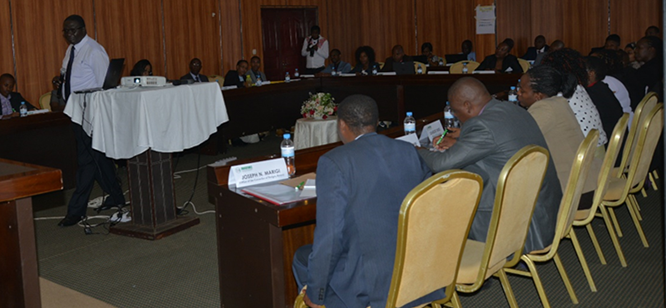- June 6, 2017
- Posted by: admin
- Categories: Current News, debt management, Debt Management

As part of efforts to enhance capacity for effective public debt management and related activities, MEFMI continues to design interventions that address the needs of its member countries. One of these areas is Public Debt Audit. Sound practice requires that governments should conduct financial, compliance and performance audits of debt management operations regularly as well as publish external audit reports. This is aimed at enhancing transparency and accountability for public debt operations. In addition, audits help in ensuring reliability and integrity of financial and operational information as well as promoting compliance with debt management objectives, governing laws and regulatory frameworks. However, most of the audit offices in the MEFMI region do not have capacity to undertake performance audits of public debt operations.
In order to address these capacity gaps, MEFMI organised a regional workshop on Public Debt Audit from 8th to 12th May 2017 at Galaxy Hotel in Kigali, Rwanda. The workshop aimed at equipping officials with practical knowledge and capacity to undertake more comprehensive and knowledgeable auditing of public debt management operations.
The workshop was officially opened, on behalf of Rwanda’s Secretary to the Treasury, by the Chief Government Internal Auditor in the Ministry of Finance and Economic Planning, Mr. Alexis Kamuhire. In his remarks, Mr. Kamuhire commended MEFMI for the continued support to its member countries in building capacity in various areas of public debt management, including public debt audit. He noted that public debt audit is important in enhancing accountability and transparency in the use of borrowed resources. He however noted that most Supreme Audit Institutions and the internal audit departments of Central Banks and Ministries of Finance and Planning do not conduct performance audits of public debt due to the lack of capacity. He added that audits have mainly focused on audits of financial statements and performance audits of selected public sector activities with a few exceptions undertaking audits of public debt management. He said that the lack of performance audits is a major weakness because it could lead to a waste of public resources. He, therefore, urged MEFMI member countries to conduct financial, compliance and performance audits of public debt operations regularly.
Speaking earlier, the Director of Debt Management Programme at MEFMI, Mr. Raphael Otieno, said that MEFMI continues to keep abreast with current trends in public debt management and aims at building capacity to meet gaps in light of changing trends. He noted with concern how public debt has been on the rise in the region whilst there is little to show in terms of projects implemented through the use of borrowed resources. In this, regard, he commended the Government of Rwanda for adopting strong governance systems which have ensured transparency and accountability in the use of borrowed resources. He said that there is need for an increased role of auditors to enhance transparency and accountability in public debt management.
The workshop covered various aspects of public debt management, including: macroeconomic theory for borrowing, debt strategy formulation, debt sustainability analysis, legal and institutional frameworks governing debt management, loan cycle, key principles and practices in debt management, among other areas. These sessions aimed at imparting knowledge of the areas that participants would be auditing. In addition, participants conducted practical exercises on how to carry out public debt audits in line with sound practice. This aimed at reinforcing the knowledge gained during the lectures.

The workshop was attended by middle to senior auditors from the supreme audit institutions as well as internal auditors from the central banks and ministries of finance. In addition, the workshop drew participants from debt management offices of the ministries of finance and central banks and this mix of participants provided a platform for interaction between auditors and debt managers. A total of 28 participants from 10 out of the 14 member countries attended the workshop.
The workshop was facilitated by five resource persons, namely Mr. Raphael Otieno, Mr. Stanislas Nkhata and Ms. Josephine Tito of the MEFMI Secretariat; Ms. Josephine Warega of the Auditor General’s Office in Kenya, and Ms. Nikeziwe Khanyile of the African Organisation of English-speaking Supreme Audit Institutions (AFROSAI-E).
The main outcome of the training was that it equipped participants with knowledge on public debt management as well as practical skills on auditing public debt.
